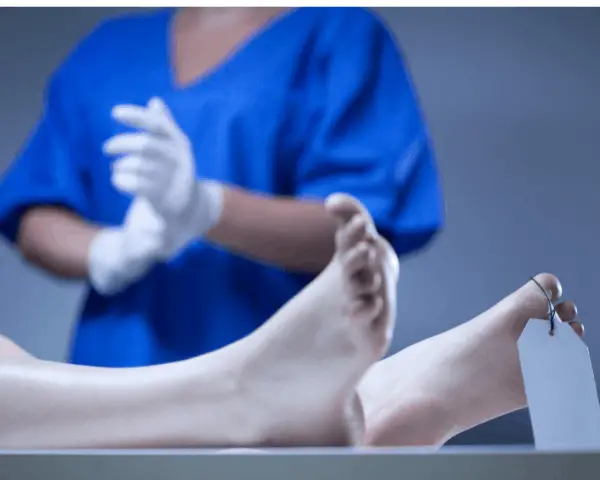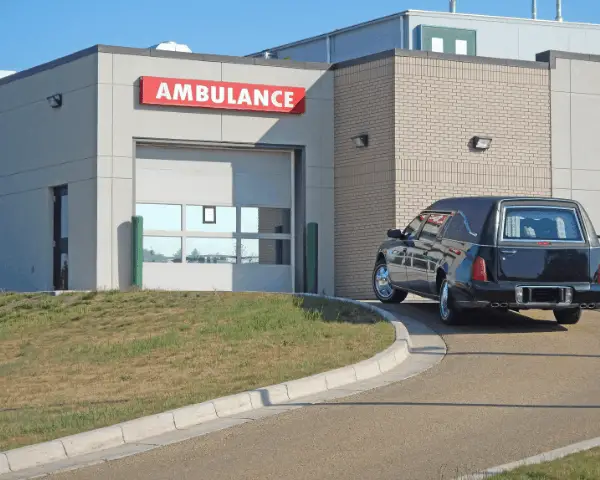If your loved one has passed away in hospital and you are planning to conduct a home funeral, you may be anxious to bring them home quickly. However, is this something you can do without the involvement of a professional funeral director?
A body can only be removed from a hospital with the correct paperwork & permission from the local authorities, this is normally applied for by funeral homes but family members CAN obtain the documents. All states have strict rules for transportation & storage of bodies which must be adhered to.
As you may have guessed it isn’t as easy as placing your recently deceased loved one in a wheel chair and taking them to your car.
In this article, I will talk about some of the factors you need to know about before trying to take a deceased family member back home, whether that is in the local area or across state lines.

What happens to a body after death in a hospital?
The exact course of action really depends on the manner of the person’s death and medical history. The very first thing that will always happen is a verbal pronouncement of death by a qualified doctor.
When the death was expected and the likely cause of death was obvious, the process is greatly expedited and no post-mortem is likely to take place. The body will be cleaned, probably in the same room, and an opportunity for the family to view the body will be given.
Once the family has seen the body they will likely be informed about the possibility for organ donation as the deceased is moved for temporary storage in the hospital morgue.
If the death was sudden and no recent doctor’s visit took place, the family will probably be asked to give permission for a medical examination of the deceased.
This often means that the body is left in the same state as when the person died so that the pathologists can get a better picture of how death occurred. The post-mortem will normally follow within a matter of hours depending on other cases.
After the examination, the body will be stored in the morgue while the correct paperwork for transportation is drawn up.
How quickly do you get the paperwork after a death?

If your loved one died in a hospital you can rest assured that the staff are well versed in the procedures and will talk you through it all. A death certificate will be issued to you and you will have a number of days, depending on your state, to file it with local authorities.
Once filed, you will be able to get a document giving you permission to have the body moved.. When working with a funeral home most of this will be taken care of for you. If you choose to have a home funeral without professional assistance, you will have to file the documents yourself.
What documents do you need to transport a dead body?
In order to transport a body from a hospital to another location you will need the following documents:
- Death certificate (issued by the coroner).
- A transportation permit
If you are planning to transport the body from state to state or by air (especially abroad), you will need to consider the following:
- Permit Letter of Non-contagious Disease
- Embalmers Affidavit
- Passport of Deceased (if obtainable)
When shipping internationally you may also need a letter on funeral home letterhead saying the following 1) only human remains are inside the casket 2) the flight itinerary; consignee’s name, address, and telephone number.
How long will a hospital hold a dead body?

A hospital will normally store a body in their morgue for at least as long as it takes to obtain the correct documentation to move it and for as long as you reasonable need to remove the body.
This is really dependent on the room available, but expect them to take care of the deceased for 4-14 days at the very least. Hospitals will not, however, hold onto bodies until the day of the funeral.
Who removes dead bodies from hospitals?
Cadavers are usually removed from the hospital morgue by a trained funeral director. This is not because it is the only legal option but often because they have the right skills and equipment to do so. Some states have strict rules for handling the dead that funeral homes are familiar with.
As funerals normally take at least a few days to organize and as long as a few weeks, having a funeral home handle the care of your deceased loved one makes a lot of sense in most cases.
However, if you have the correct documentation hospitals will also release the body into your possession. Many states don’t require you to use a trained funeral director in any stage of the funeral process, so you do have the right in some states to handle this part yourself.
This being said, if the deceased died from a disease that is transmittable, then the law will require a trained professional to handle the body and you are unlikely to be legally allowed to take your family member home from the hospital.
Who has the rights to a dead body?
In most US states the legal right to carry out a burial (or cremation) is given to the next of kin. This normally means the spouse of the deceased. When unmarried, this right is passed to the executor named in the Will. If the deceased has no legal document stating their executor or next of kin, and no family exists, then the responsibility falls to the state
In short, if you have all of the legal documentation a hospital cannot refuse you the right to remove a body from their morgue. The only exception would be when the body poses a health risk to the public.
How much does it cost to transport a corpse?

Transporting a dead body by road will cost as much as the rental of a hearse or similar vehicle. Transporting a body by plane can cost as much as $10,000 internationally and $5,000 domestically. A death certificate will cost around $25 and if embalming is necessary, it could cost up to $800.
Generally a funeral home will charge in the range of $1,000 to $3,000 depending on where the body is coming from and where you want it to be delivered to.
For more information about transporting a body by air, please read my full article here.
How do you transfer a deceased person to another state?
When a person dies out of state, it’s not uncommon for their body to be transported back home. In almost all cases the easiest option is to hire a special company to handle the transportation. Often air freight is the best option, but when you are crossing only one state line driving may be a better one.
Private citizens are allowed to transport bodies with the correct documentation. You also don’t need to worry about embalming a body unless you are crossing into or out of Alabama, Alaska, and New Jersey. However, check with your coroner to double-check that you are exempt from this and also refer to the Federal funeral rule to be sure.
Don’t load up your truck and start driving until you have the death certificate, permission to transport the body for burial and identification documents for the deceased.





